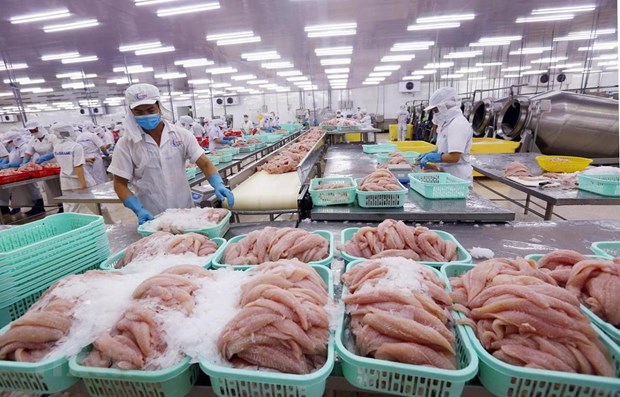 Society
Society


|
| Workers process tra fish for export in a seafood plant the southern city of Cần Thơ. VNA/VNS Photo Danh Lam |
HÀ NỘI — Digital technology and innovation play an important role in increasing production efficiency, productivity, food safety and distribution, as well as in connecting producers with consumers, according to Deputy Prime Minister Phạm Bình Minh.
The Deputy PM was speaking at the second National Dialogue on Việt Nam's Food Systems on Friday in Hà Nội.
Minh added it was also crucial to minimise food losses and wastes, and create better resilience of agricultural supply chains, raise awareness and promote green and sustainable consumption to protect the environment and public health.
“The Government of Việt Nam is fully aware of the need for close coordination among countries and actors in the food systems to create revolutionary, sustainable and extensive changes of the whole systems.
"This will help us do better in the cause of alleviating poverty, ensuring food and nutrition security in the rural areas, especially in the remote or ethnic minorities' regions, and among vulnerable groups in a more effective and sustainable manner, with a special focus on women and children,” he said.
Stakeholders both within and outside the food sector could share their experience and develop the value chains of Việt Nam's key agricultural products toward transparency, responsibility and sustainability, he said.
Viêt Nam's agriculture plays a particularly important role in ensuring food security, social stability and livelihoods for more than 60 per cent of the population living in rural areas, and contributed 14.85 per cent of the country's GDP last year.
Despite the impacts of the COVID-19 pandemic, as well as climate change and natural disasters, Việt Nam's agriculture sector maintained a growth rate of 2.68 per cent in 2020.
The export turnover of agricultural, fish and forest products hit US$41.53 billion in 2020 and $24.23 billion in the first half of 2021.
Minister of Agriculture and Rural Development Lê Minh Hoan said grassroots farmers’ organisations should be made a key part of agriculture value chains.
It was also necessary to diversify public-private partnership models to attract private investors and promote responsible, transparent and sustainable agricultural value chains, he said.
Effective links between farmers’ groups and enterprises should be expanded to help increase transparency and fairness in farming product consumption, ensure consumers’ rights and protect human health and the environment, he said.
Hoan said Việt Nam's diverse food systems are facing many challenges.
Global forecasts and empirical data in recent years show Việt Nam is one of the countries most heavily affected by climate change.
Việt Nam needs to form smart, resilient and sustainable food systems, not only ensuring food and nutrition security for nearly 100 million Vietnamese people but also contributing to global food security, he said.
Kamal Malhotra, the UN Resident Coordinator, said at the summit that Việt Nam today was not only producing sufficient food quantities to feed the population, but also contributing to ensuring world food security.
“However, the Vietnamese food systems are also facing critical challenges. Nutritional security remains a dilemma mainly due to unhealthy diets and unsafe food. Environmental degradation due to natural resource depletion and chemical overuse is becoming more and more alarming. The unequal value distribution, inability to attract young workers, lack of market connectivity, and weak supply chain management have reduced the competitiveness of agriculture and food industry,” he said.
Carolyn Turk, World Bank Country Director for Vietnam, said: “The agricultural sector, with its enormous progress over the past three decades, has played a central role in Việt Nam’s successes in reducing poverty and maintaining food security and social stability.”
“However, the sector is facing daunting challenges which, if left unresolved, will put the country at risk of not fulfilling the sustainable development goals,” she said.
She warned that the sector is the third-largest emitter of greenhouse gases, agricultural production is extremely vulnerable to climate change and food safety remains a major public health and trade concern.
“Now is the time for the sector to transform itself into a greener, more sustainable and inclusive one. The World Bank and other development partners stand ready to join forces with the government and the private sector to foster such transformation,” she said.
Francisco Pichon, Country Director, International Fund for Agricultural Development (IFAD) for Việt Nam and Mekong Region said as a specialised agency of the UN and an international financial institution, IFAD remains committed to support Việt Nam to work for more inclusive and sustainable food systems.
“IFAD has an important comparative advantage as an agent of change in the agriculture and rural sector, access to rural finance and development of last mile’s small-scale rural infrastructure for inclusive, pro-poor value chains.
"And we target all our interventions in the poorer and more remote and underserved rural areas of Việt Nam with a high concentration of ethnic minorities," he said.
After the summit, Việt Nam will develop a roadmap for transforming food systems to implement and review the suitability of the food system framework.
In the implementation process, it is necessary to solicit support from ministries, agencies, local authorities, development partners, businesses, associations, international organisations, NGOs, scientists, experts, and the public, in ensuring the achievement of socio-economic outputs, including nutritional and health ones, and minimising negative impacts on the environment, contributing to the successful roll-out of the 2030 Agenda for Sustainable Development.
At the second national dialogue, the draft on the priorities and implementation roadmap for transforming the food systems in Việt Nam was introduced. VNS




